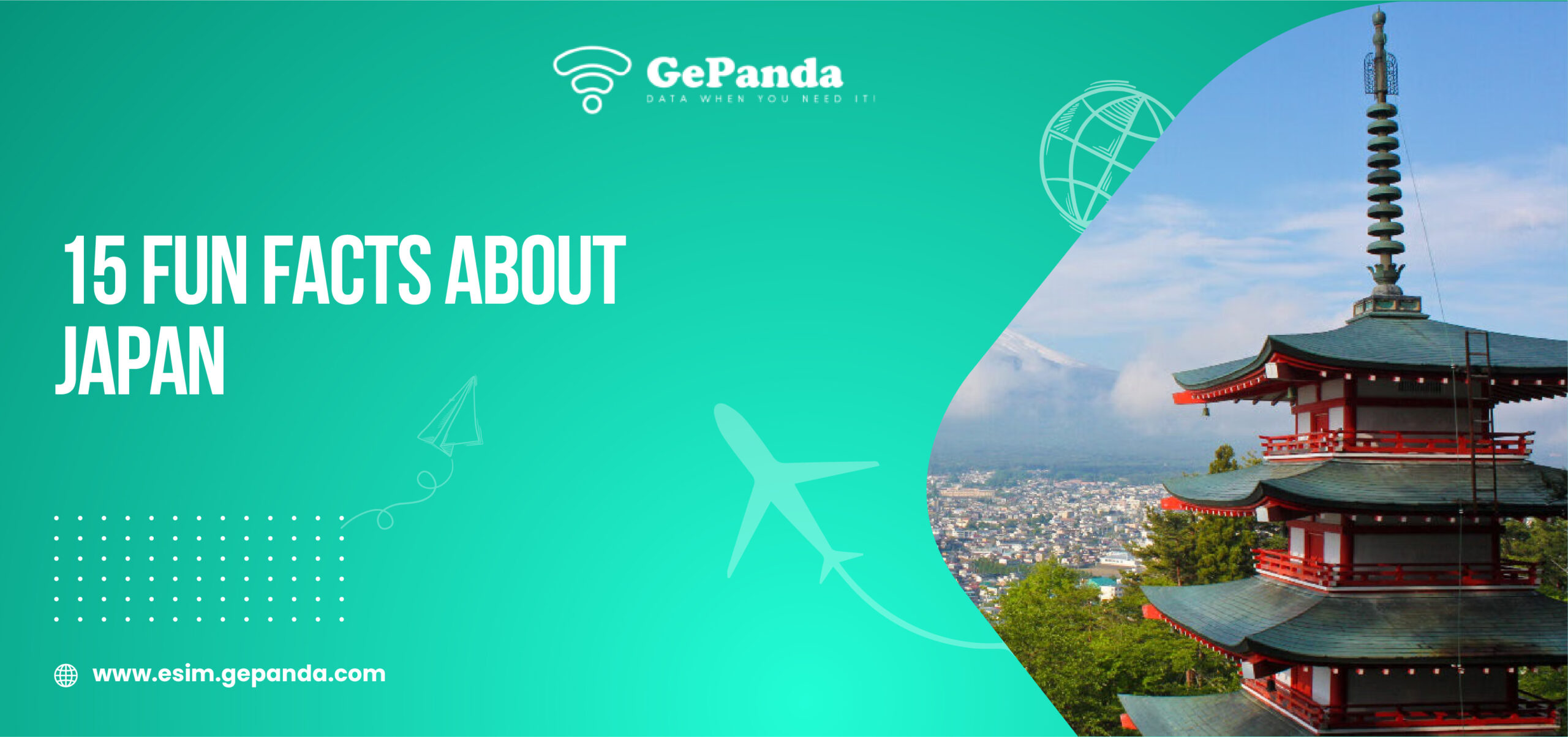Japan is a country that seamlessly combines ancient traditions with modern technology. It’s a place where cherry blossoms bloom alongside towering skyscrapers, and where centuries-old customs coexist with the latest in robotics. From its fascinating food culture to its breathtaking landscapes, Japan offers something for everyone. Whether you’re planning a visit or just curious about what makes this island nation so unique, here are 15 fun facts that might surprise you.
1. The Birthplace of Sushi
Sushi, one of Japan’s most famous culinary exports, originated as a method of preserving fish. In its early form, fish was fermented with rice to keep it fresh. Over time, it evolved into the sushi we know today, with fresh fish placed on top of vinegared rice. Now, sushi is enjoyed worldwide and remains an essential part of Japanese culture. It’s not just food; it’s art.
2. Japan’s Unique Architecture
Japan is known for its distinctive blend of traditional and modern architecture. While ancient temples and shrines, like those in Kyoto, represent Japan’s spiritual heritage, the country’s modern skyline is defined by futuristic buildings and designs. Tokyo, for instance, boasts a mix of glass skyscrapers and traditional wooden houses, symbolizing Japan’s ability to preserve its past while embracing the future.
Explore More About Japan and eSIM Connectivity:
If you’re planning a trip to Japan, be sure to check out our Japan eSIM guide for everything you need to know about staying connected while traveling.
3. Mount Fuji: A National Icon
Mount Fuji is Japan’s highest peak and one of the country’s most iconic symbols. Not only is it a UNESCO World Heritage site, but it also holds cultural and spiritual significance for the Japanese people. Mount Fuji is often seen as a place of pilgrimage, with thousands of visitors trekking to its summit each year. Its symmetrical cone is a sight to behold, particularly during the cherry blossom season when it creates a stunning backdrop.
4. The Japanese Tea Ceremon
The Japanese tea ceremony, or chanoyu, is a centuries-old tradition that involves the ritual preparation and consumption of matcha, powdered green tea. This ceremony is not just about drinking tea; it’s an expression of Zen Buddhism, emphasizing harmony, respect, purity, and tranquility. The intricate steps involved in the ceremony reflect Japan’s deep connection to nature and mindfulness.
5. Japan’s Cherry Blossom Season
Japan’s cherry blossom season, known as hanami, is one of the most anticipated events of the year. In spring, the country’s parks and streets are covered in pink and white blossoms, creating a picturesque setting. The cherry blossom holds significant meaning in Japanese culture, symbolizing the fleeting nature of life. People gather under the blossoms to appreciate their beauty and reflect on life’s transient nature.
6. Japan’s Love for Technology
Japan is a global leader in technological innovation. It’s home to robotics, advanced electronics, and some of the most efficient transportation systems in the world. The country has made significant strides in automation, with robots playing a vital role in various sectors, from manufacturing to healthcare. Japan is also the birthplace of video game giants like Nintendo and Sony, whose innovations have shaped entertainment worldwide.
7. The Land of Vending Machine
Japan has a remarkable number of vending machines—there’s roughly one for every 23 people. These machines don’t just sell soda and snacks; in Japan, you can find vending machines offering everything from fresh eggs to umbrellas. Their presence in public spaces highlights Japan’s culture of convenience and efficiency, making everyday life a little easier.
8. Japan’s Public Transportation Efficiency
Japan’s public transportation system is known for being among the most efficient in the world. The Shinkansen, or bullet train, is famous for its punctuality, speed, and comfort. The trains in Japan are not only reliable but also incredibly clean, with most arriving and departing on time to the second. Travelers can easily navigate cities like Tokyo with the help of detailed transit maps and well-maintained subway systems.
9. The Japanese Art of Ikebana
Ikebana, the Japanese art of flower arranging, is more than just decorating with flowers. It’s a spiritual and meditative practice that reflects the beauty of nature. Unlike Western flower arrangements that focus on fullness, Ikebana is minimalist, with an emphasis on line, balance, and simplicity. The arrangements are often asymmetrical and designed to evoke a sense of harmony.
10. Japanese Festivals
Japan is home to many vibrant festivals throughout the year, each with its own unique cultural significance. The Gion Matsuri in Kyoto is one of the most famous, celebrated with parades, traditional performances, and street festivals. Other notable festivals include Tanabata, where people write their wishes on paper and hang them on bamboo trees, and Obon, a Buddhist holiday honoring deceased ancestors.
11. Japan’s Love for Manga and Anime
Manga (Japanese comic books) and anime (animated TV shows) are a huge part of Japanese pop culture. From Naruto to One Piece, anime has become a global phenomenon, influencing millions of fans worldwide. Manga, which is read by people of all ages in Japan, has a rich history and covers a variety of genres, from action and adventure to romance and slice-of-life stories.
12. Japan’s Unique Toilet Technology
Japan is known for its high-tech toilets, which have features like heated seats, bidet functions, and even music for privacy. The country’s obsession with hygiene and comfort has made these toilets an integral part of Japanese homes and public spaces. They often come with advanced features such as water pressure adjustments, air dryers, and odor-eliminating functions, making them one of Japan’s quirkiest inventions.
13. The Japanese Custom of Giving Gifts
Gift-giving in Japan is a deeply ingrained custom that represents respect, gratitude, and goodwill. It’s common for people to exchange gifts on special occasions like birthdays, weddings, and festivals. The way a gift is wrapped and presented is just as important as the gift itself, with attention to detail being key. In Japan, it’s customary to give a gift with both hands as a sign of respect.]
Get Inspired by Japan’s Food Culture and Connectivity:
Looking to make your travel easier? Check out how eSIM is the smarter choice for global travelers and enhance your experience.
14. Japan’s Clean Streets and Public Spaces
Despite the high population density in cities like Tokyo, Japan is remarkably clean. Public spaces, including parks, streets, and train stations, are often spotless, as the Japanese take great pride in cleanliness. Interestingly, there are very few public trash cans in Japan, yet locals bring their trash home to dispose of it. This commitment to cleanliness is a reflection of the country’s cultural values of respect and responsibility.
15. Japan’s Unique Islands and Geography
Japan is made up of more than 6,000 islands, each with its own distinctive charm. While Honshu, Japan’s main island, is home to cities like Tokyo and Kyoto, other islands like Okinawa offer tropical beaches and a relaxed lifestyle. The island of Hokkaido is known for its snow-capped mountains and outdoor activities, making Japan a destination with diverse landscapes to explore.
Conclusion
From its world-renowned cuisine to its remarkable technological innovations, Japan is a country full of surprises. The 15 facts above only scratch the surface of what makes Japan so unique. Whether you’re drawn to its rich history, vibrant culture, or modern advancements, Japan offers something for everyone. Ready to experience the wonders of this fascinating country? There’s no better time than now to start planning your journey.


